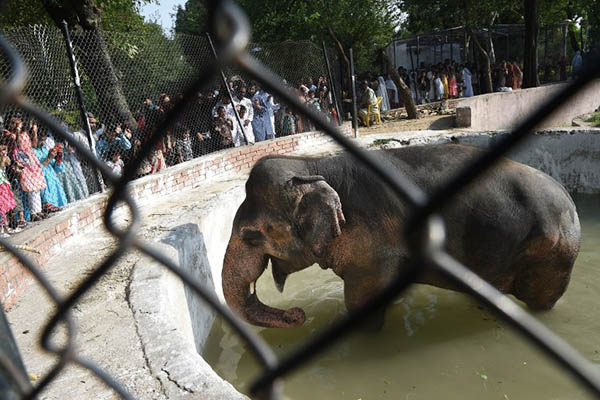
File photo of Kaavan. Farooq Naeem—AFP
In judgment on animal welfare issues, court also directs authorities to prescribe policy on managing stray dog populations
The Islamabad High Court (IHC) on Thursday ruled that animals held in captivity at the federal capital’s Marghazar Zoo “have been kept in conditions that tantamount to subjecting them to unnecessary pain and suffering and thus in violation of the Prevention of Cruelty to Animals Act 1890 and the Wildlife Ordinance of 1979.”
In a judgment authored by Chief Justice Athar Minallah, the court held that the Marghazar Zoo did not have “the facilities or resources to meet the behavioral, social and physiological needs of the animals kept in captivity under inappropriate and illegal conditions.”
It said that the petition, filed by the Islamabad Wildlife Management Board against the Metropolitan Corporation Islamabad, had raised concerns about the welfare of Kaavan, an elephant that has been kept chained in a small enclosure of 90x140m for more than 30 years.
“Kaavan, the elephant, has been treated cruelly by subjecting him to unimaginable pain and suffering for the past three decades and his continued captivity in the circumstances would expose the authorities to criminal consequences under the Act of 1890. The pain and suffering of Kaavan must come to an end by relocating him to an appropriate elephant sanctuary, in or outside the country,” it said.
In his ruling, Chief Justice Minallah has ruled that Kaavan must be relocated to a suitable sanctuary within 30 days “preferably in consultation with and the consent of the High Commissioner of Sri Lanka.” He said that the assistance of experts and international organizations could also be availed.
Kaavan was gifted to Pakistan by Sri Lanka in 1985 when he was just a year old. His plight went viral on social media around five years ago, with a petition gathering over 200,000 signatures for his freedom or relocation. His behavior—including signs of distress such as bobbing his head repeatedly—demonstrated “a kind of mental illness,” Safwan Shahab Ahmad of the Pakistan Wildlife Foundation told news agency AFP in 2016.
Kaavan had drawn the attention of several international figures, including pop star Cher who hailed his freedom on Twitter. “WE HAVE JUST HEARD FROM PAKISTAN HIGH COURT KAAVAN IS FREE,” she tweeted. “THIS IS ONE OF THE GREATEST MOMENTS OF MY LIFE,” she added.
Other animals
In its judgment, the Islamabad High Court has also ruled that the Marghazar Zoo is unsuitable for any wildlife. It said the Wildlife Management Board must relocate all other animals at the zoo to their respective sanctuaries within 60 days, adding that the board would now take over the management of the zoo. The climate change minster and members of the board would jointly be liable for the welfare and wellbeing of each animal till their relocation to their respective sanctuaries, the judgment added.
Per the judgment, the board cannot keep any new animal in the zoo until a reputable international agency, specializing in zoological gardens, has certified that facilities and resources are available to provide for the behavioral, social and physiological needs of each species of animals.
It also said the board must inspect all zoos established in Islamabad to determine whether animals were being treated in accordance with law, adding that it would be assisted by the Islamabad chief commissioner and the inspector general of police to enforce the provisions of the Wildlife Ordinance 1979 and the Act of 1890 so “that no animal is treated in a manner that subjects it to unnecessary pain and suffering.”
Awareness
In its ruling, the Islamabad High Court advised the federal and provincial governments to consider including as part of the Islamic Studies curriculum the teachings of Islam on the importance of taking care of animals, their welfare and wellbeing, as highlighted in the Ahadiths and Quran. “The media may also consider educating and informing the general public regarding the manner in which creation of Allah i.e animal species ought to be treated,” it added.
Dog culling
Referring to the brutal practice of dog culling that is widespread across Pakistan, the IHC directed the Wildlife Management Board to prescribe a policy and mechanism regarding stray dogs. “It is expected that the Board, while formulating the policy, will have regard to the best practices observed internationally and the injunctions of Islam which teaches treating animals in humane manner,” it added.
